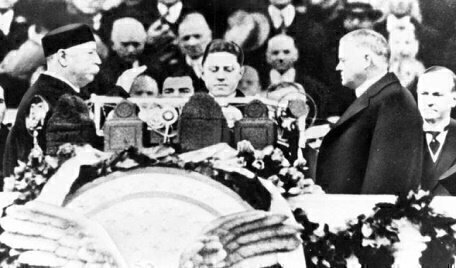Donald Trump becomes the 47th President of the United States shortly after 12 p.m. on Monday, Jan. 20, 2025. Here is a look at some facts about the inaugural event and inauguration traditions through the years.

Washington’s first inauguration required some improvisation. George Washington arrived in New York City on April 30, 1789, with much fanfare, and then a large crowd gathered in what turned out to be a parade. When Washington arrived at Federal Hall, someone realized they forgot a Bible and obtained one from a nearby Masonic Lodge. Washington also started the inaugural address tradition.
Inaugurations were first held on March 4. After Washington’s first inauguration, March 4 became the official day for the start of a new administration. The 20th Amendment moved the day to January 20 – closer to the start of a new Congress.
Not all inaugurations were held on January 20 or March 4. If those days fell on a Sunday, the public ceremony fell on the next day, while the new or returning president took the oath privately on Sunday.
William Henry Harrison wasn’t probably killed by his inauguration. One of the biggest stories in inauguration history was that President Harrison died in 1841 because he gave a long inaugural address in cold weather and became sick. Harrison died about 30 days after his inauguration. He became sick three weeks after the inauguration, leading some to now believe another illness, possibly typhoid fever, killed the new President.
The president is required to recite a specific oath under the Constitution. Article II, Section 1 of the Constitution spells out the presidential oath: "I do solemnly swear (or affirm) that I will faithfully execute the Office of President of the United States, and will to the best of my ability, preserve, protect and defend the Constitution of the United States."
We don’t really know who added “Under God” to the oath. Author Washington Irving claimed George Washington started the tradition of adding “So help me God” at the oath’s end. There is no direct evidence of that. Others believe Chester Alan Arthur used the words when he took the oath after James Garfield died.
Hoover was the last president to not say “Under God” after his oath. In modern times, every President since Herbert Hoover has added “So help me God” at the oath’s end. Newsreel footage from 1929 shows Chief Justice William Howard Taft reading the oath to Hoover, who simply says, “I do” at the end.
John Quincy Adams didn’t take his oath on a Bible. Adams used a law book instead that contained the Constitution.
The vice president takes a different oath. The vice president takes his or her oath before the president and it is a bit longer. “I do solemnly swear (or affirm) that I will support and defend the Constitution of the United States against all enemies, foreign and domestic; that I will bear true faith and allegiance to the same; that I take this obligation freely, without any mental reservation or purpose of evasion; and that I will well and faithfully discharge the duties of the office on which I am about to enter: So help me God.”
The Chief Justice usually administers the inaugural oath, with few exceptions. After Washington’s inauguration, the Chief Justice of the United States has read the oath at public inauguration ceremonies. The exceptions have occurred after the death of a president when there is an urgent need for the new president to continue the office. The last person to administer the oath who wasn’t a Chief Justice was Federal Judge Sarah T. Hughes in 1963, after President Kennedy’s death.







